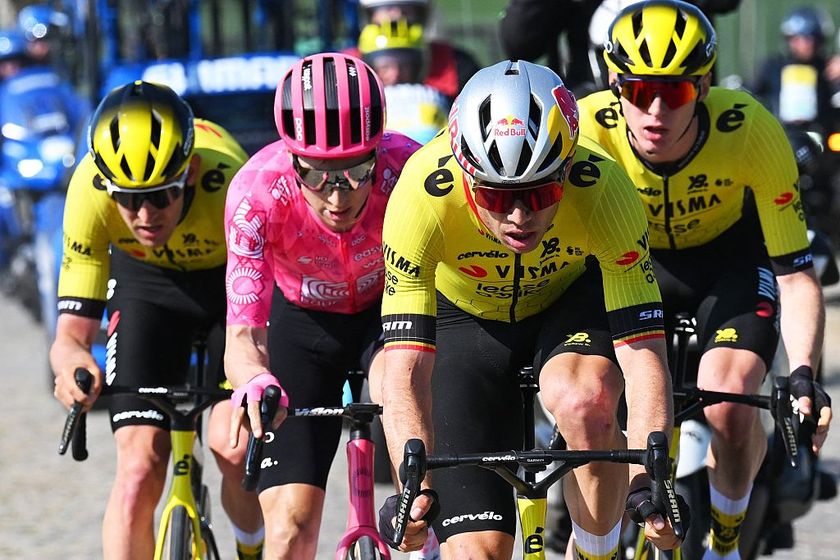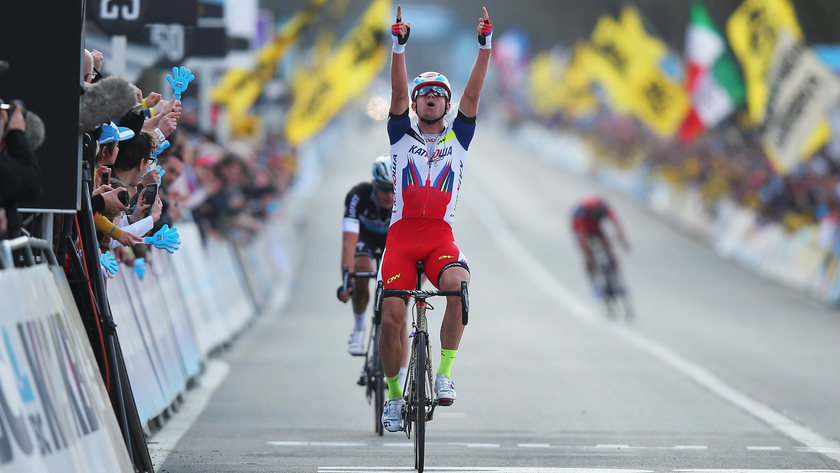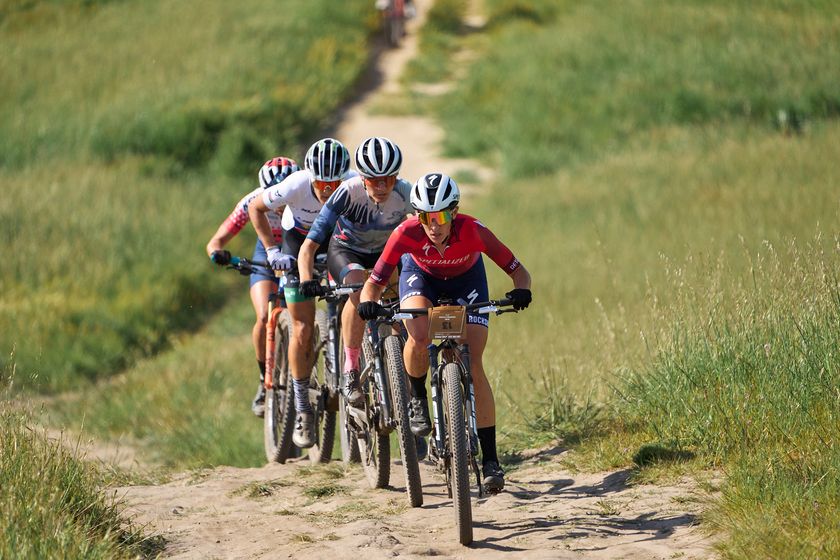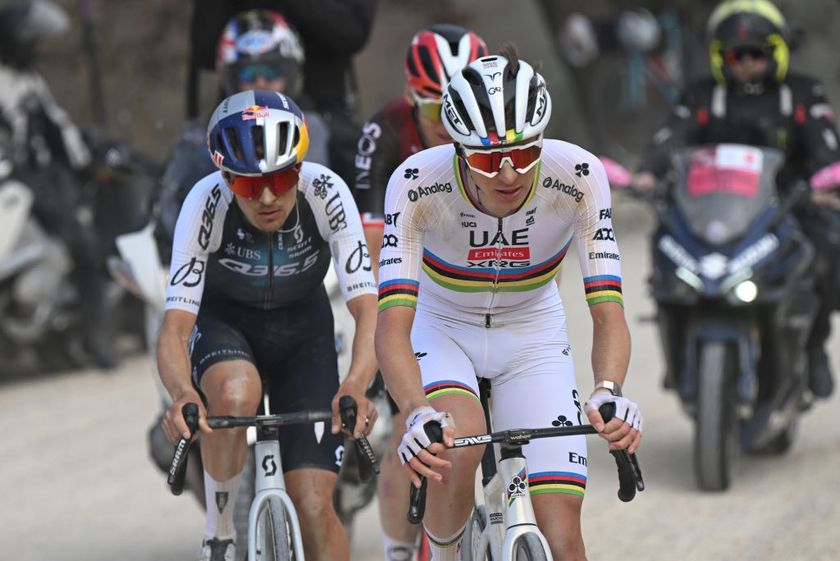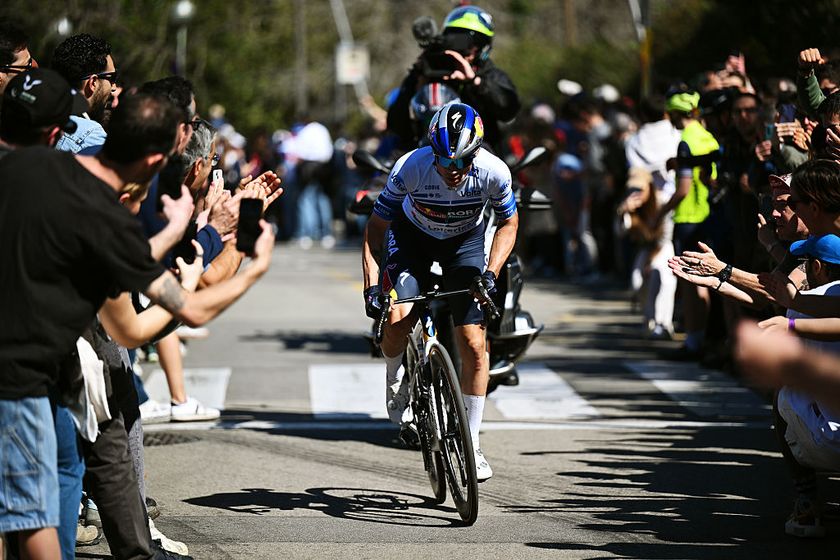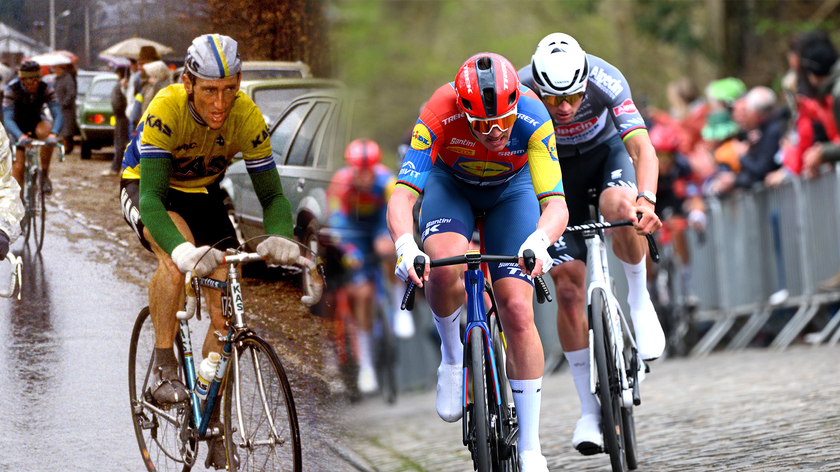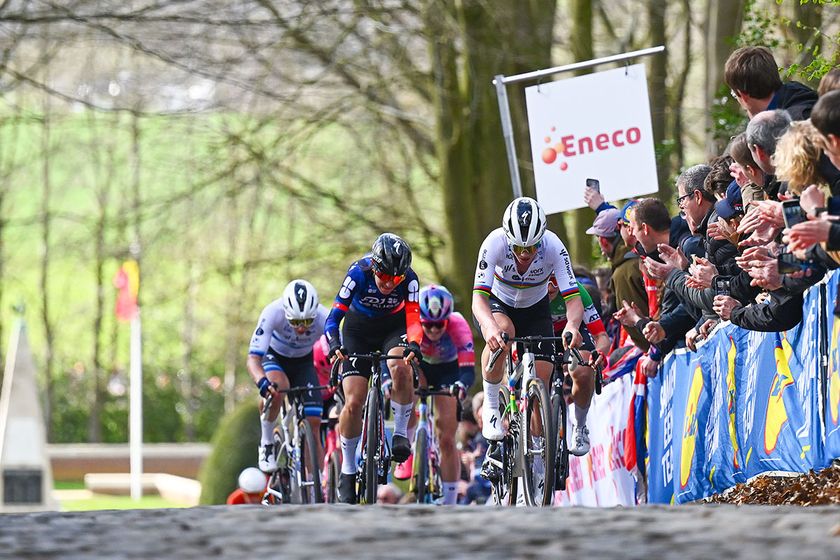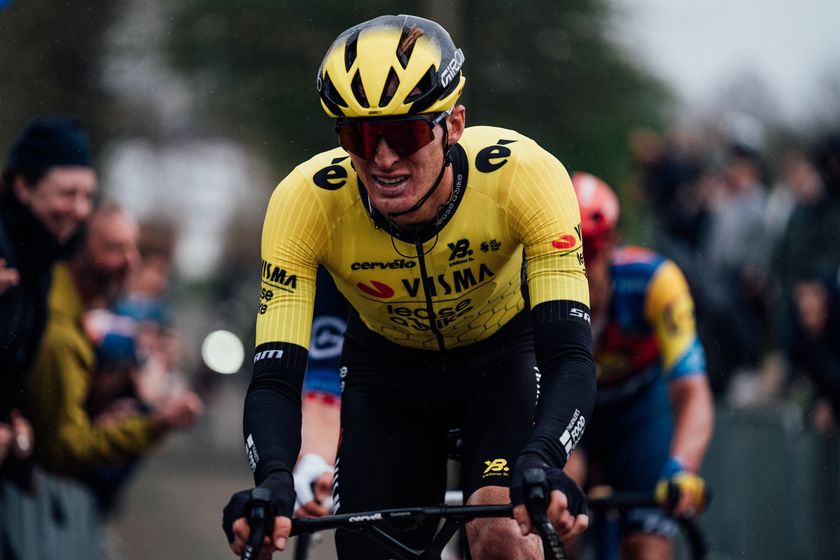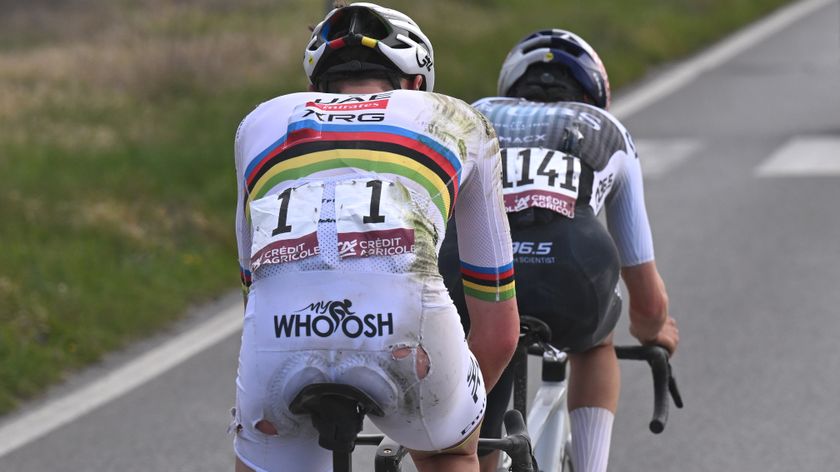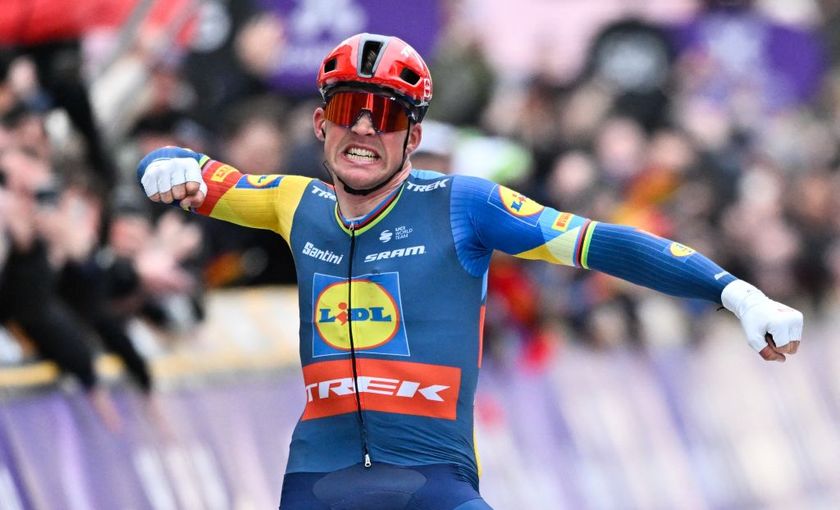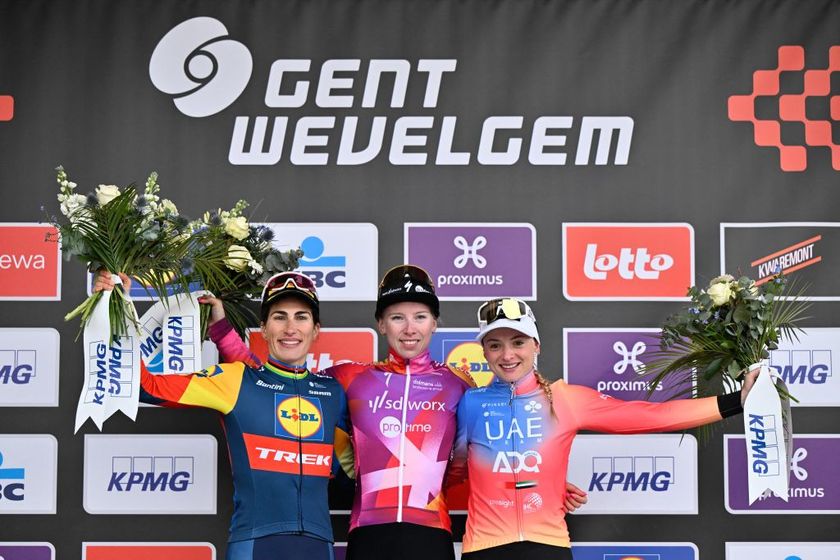Fitness questions and answers for January 31, 2005
Got a question about fitness, training, recovery from injury or a related subject? Drop us a line at...
Form & Fitness Q & A
Got a question about fitness, training, recovery from injury or a related subject? Drop us a line at fitness@cyclingnews.com. Please include as much information about yourself as possible, including your age, sex, and type of racing or riding. Due to the volume of questions we receive, we regret that we are unable to answer them all.
Carrie Cheadle, MA (www.carriecheadle.com) is a Sports Psychology consultant who has dedicated her career to helping athletes of all ages and abilities perform to their potential. Carrie specialises in working with cyclists, in disciplines ranging from track racing to mountain biking. She holds a bachelors degree in Psychology from Sonoma State University as well as a masters degree in Sport Psychology from John F. Kennedy University.
Dave Palese (www.davepalese.com) is a USA Cycling licensed coach and masters' class road racer with 16 years' race experience. He coaches racers and riders of all abilities from his home in southern Maine, USA, where he lives with his wife Sheryl, daughter Molly, and two cats, Miranda and Mu-Mu.
Kelby Bethards, MD received a Bachelor of Science in Electrical Engineering from Iowa State University (1994) before obtaining an M.D. from the University of Iowa College of Medicine in 2000. Has been a racing cyclist 'on and off' for 20 years, and when time allows, he races Cat 3 and 35+. He is a team physician for two local Ft Collins, CO, teams, and currently works Family Practice in multiple settings: rural, urgent care, inpatient and the like.
Fiona Lockhart (www.trainright.com) is a USA Cycling Expert Coach, and holds certifications from USA Weightlifting (Sports Performance Coach), the National Strength and Conditioning Association (Certified Strength and Conditioning Coach), and the National Academy for Sports Nutrition (Primary Sports Nutritionist). She is the Sports Science Editor for Carmichael Training Systems, and has been working in the strength and conditioning and endurance sports fields for over 10 years; she's also a competitive mountain biker.
Eddie Monnier (www.velo-fit.com) is a USA Cycling certified Elite Coach and a Category II racer. He holds undergraduate degrees in anthropology (with departmental honors) and philosophy from Emory University and an MBA from The Wharton School of Business.
Eddie is a proponent of training with power. He coaches cyclists (track, road and mountain bike) of all abilities and with wide ranging goals (with and without power meters). He uses internet tools to coach riders from any geography.
Get The Leadout Newsletter
The latest race content, interviews, features, reviews and expert buying guides, direct to your inbox!
David Fleckenstein, MPT (www.physiopt.com) is a physical therapist practicing in Boise, ID. His clients have included World and U.S. champions, Olympic athletes and numerous professional athletes. He received his B.S. in Biology/Genetics from Penn State and his Master's degree in Physical Therapy from Emory University. He specializes in manual medicine treatment and specific retraining of spine and joint stabilization musculature. He is a former Cat I road racer and Expert mountain biker.
Since 1986 Steve Hogg (www.cyclefitcentre.com) has owned and operated Pedal Pushers, a cycle shop specialising in rider positioning and custom bicycles. In that time he has positioned riders from all cycling disciplines and of all levels of ability with every concievable cycling problem.They include World and National champions at one end of the performance spectrum to amputees and people with disabilities at the other end.
Current riders that Steve has positioned include Davitamon-Lotto's Nick Gates, Discovery's Hayden Roulston, National Road Series champion, Jessica Ridder and National and State Time Trial champion, Peter Milostic.
Pamela Hinton has a bachelor's degree in Molecular Biology and a doctoral degree in Nutritional Sciences, both from the University of Wisconsin-Madison. She did postdoctoral training at Cornell University and is now an assistant professor of Nutritional Sciences at the University of Missouri-Columbia where she studies the effects of iron deficiency on adaptations to endurance training and the consequences of exercise-associated changes in menstrual function on bone health.
Pam was an All-American in track while at the UW. She started cycling competitively in 2003 and is the defending Missouri State Road Champion. Pam writes a nutrition column for Giana Roberge's Team Speed Queen Newsletter.
Dario Fredrick (www.wholeathlete.com) is an exercise physiologist and head coach for Whole Athlete™. He is a former category 1 & semi-pro MTB racer. Dario holds a masters degree in exercise science and a bachelors in sport psychology.
Scott Saifer (www.wenzelcoaching.com) has a Masters Degree in exercise physiology and sports psychology and has personally coached over 300 athletes of all levels in his 10 years of coaching with Wenzel Coaching.
Kendra Wenzel (www.wenzelcoaching.com) is a head coach with Wenzel Coaching with 17 years of racing and coaching experience and is coauthor of the book Bike Racing 101.
Steve Owens (www.coloradopremiertraining.com) is a USA Cycling certified coach, exercise physiologist and owner of Colorado Premier Training. Steve has worked with both the United States Olympic Committee and Guatemalan Olympic Committee as an Exercise Physiologist. He holds a B.S. in Exercise & Sports Science and currently works with multiple national champions, professionals and World Cup level cyclists.
Through his highly customized online training format, Steve and his handpicked team of coaches at Colorado Premier Training work with cyclists and multisport athletes around the world.
Brett Aitken (www.cycle2max.com) is a Sydney Olympic gold medalist. Born in Adelaide, Australia in 1971, Brett got into cycling through the cult sport of cycle speedway before crossing over into road and track racing. Since winning Olympic gold in the Madison with Scott McGrory, Brett has been working on his coaching business and his www.cycle2max.com website.
Richard Stern (www.cyclecoach.com) is Head Coach of Richard Stern Training, a Level 3 Coach with the Association of British Cycling Coaches, a Sports Scientist, and a writer. He has been professionally coaching cyclists and triathletes since 1998 at all levels from professional to recreational. He is a leading expert in coaching with power output and all power meters. Richard has been a competitive cyclist for 20 years
Andy Bloomer (www.cyclecoach.com) is an Associate Coach and sport scientist with Richard Stern Training. He is a member of the Association of British Cycling Coaches (ABCC) and a member of the British Association of Sport and Exercise Sciences (BASES). In his role as Exercise Physiologist at Staffordshire University Sports Performance Centre, he has conducted physiological testing and offered training and coaching advice to athletes from all sports for the past 4 years. Andy has been a competitive cyclist for many years.
Michael Smartt (www.cyclecoach.com) is an Associate Coach with Richard Stern Training. He holds a Masters degree in exercise physiology and is USA Cycling Expert Coach. Michael has been a competitive cyclist for over 10 years and has experience coaching road and off-road cyclists, triathletes and Paralympians.
Kim Morrow (www.elitefitcoach.com) has competed as a Professional Cyclist and Triathlete, is a certified USA Cycling Elite Coach, a 4-time U.S. Masters National Road Race Champion, and a Fitness Professional.
Her coaching group, eliteFITcoach, is based out of the Southeastern United States, although they coach athletes across North America. Kim also owns MyEnduranceCoach.com, a resource for cyclists, multisport athletes & endurance coaches around the globe, specializing in helping cycling and multisport athletes find a coach.
Lower back pain
Heart Rate
Drop in max HR
Cleat position question
Low Heart rate during training
Bone density
Vitamin questions
Lower back pain
I've been struggling for a couple of years trying to remedy a major pain in my lower left back, which occurs about 30 minutes into a ride. I read your replies on related matters in the Fitness section and as a result purchased 'Overcoming Neck and Back Pain'. Based on reading the book I learnt that my left leg is about 1cm longer than my right, and so I installed 1/2cm heel lifts in my walking shoes, and 1/2cm cleat shims in my cycling shoes. I also learnt that the hip flexors, hips and hamstring muscles in both my legs have poor flexibility. I hoped to improve this as part of carrying out the set of stretching exercises specifically recommended for lower back problems twice a week. Also, from reading the book it sounded like stretching my QL muscles could be a cure to my problem, so I made sure I stretched these also. However, six months later, none of the above action showed results.
I've also tried attending Pilates classes at the local leisure centre and working through the exercises in the Pilates book you recommended, 'Pilates for Dummies'. Finally, I recently saw a Chiropractor for two sessions. He was adamant the problem was due to a stiff L4 vertebrae, and so spent time trying to mobilize it. However, again, these actions showed no results.
I'm not sure whether it's related, but my pedal stroke has always caused significant movement in my upper body (to the point of being almost out of control at highish cadences - around 160). I'm convinced my saddle isn't too high as I have a bend in both of my legs under load, and I don't get any pulling at the top of my hamstrings after a long hilly ride. I do have a small mpg video I can send you of me from behind on my turbo if this would help diagnosis and you'd be willing to look at it.
With the above in mind, I was wondering if you had any advice you could give me? I realize I may not have given you all the information you need, or that it may be impossible to properly diagnose remotely, but I'm getting despondent and any advice you could give me that would help me make progress would be hugely appreciated. I'm not sure if they have any bearing, but I've put into practice the instructions you've given to others on fitting and I tend to have a natural tendency to grind gears.
Neil
Steve Hogg replies
G'day Neil,
Heart Rate
I am a 35-year-old rider who has been regularly riding a bike for about a decade, and have been experimenting on heart rate monitor training. When I started riding seriously a few years back and started to use a heart rate monitor, it did wonders for me. I have improved from being the novice in the group to a very good cat 5 local rider.
However, I've always read on all the training books and magazines that the most common way to determine your max HR is 220 minus your age. When I follow that formula and follow the recommended training efforts in books and magazines my bike barely moves. Meaning that 60% of my max hr is 110 bps. This is my HR the moment I hop on the bike without even starting to pedal. When I to out to train I increase the max to about 195 to be able to at least so that my bike will at least move if the training calls for 60% effort. Am I putting myself in any kind of danger by doing this?
I understand that the training books and magazines recommend these numbers based upon an "average" person. But do they mean that average person who does not exercise or the average athlete?
I am planning to do a few local races this year, and I have never had a coach before but have done ok. I really want to improve without spending the money for a professional trainer. Please enlighten me on the heart rate monitor issues so I can base my training on the correct numbers.
Raymond de Leon
Scott Saifer replies
Hi Raymond,
Drop in max HR
Hi there,
Something peculiar has happened to me and I would be grateful if you could clarify. I am 38-years-old and have been training steadily about 10 hours cycling per week since September last year. It's been almost exclusively low intensity -ie- Zone-2 type work, and all indoor on a turbo.
When I measured my max HR early last year it was 194 and I planned my workouts accordingly. I was able to reach 194 throughout the year. I am now starting to plan specific workouts for this spring and I have made three attempts to measure my max HR and I have not been able to exceed 175 - a drop of 19 points since last year.
I feel stronger than at the same time last year and my condition is better vis a vis my cycling team mates than it was last year. I am therefore curious why my max HR has dropped so much. I would also add that last year I was running a HR of about 135 during easy rides while now my easy rides at the same effort are 125 or less. Most of my work since last fall has been indoors on a turbo, where I have been able to keep a very steady effort throughout my rides.
Should I continue to try to force my max HR up further or should I set my work out zones based on my 'new' max HR of 175? I'd be grateful for your assistance.
Fred Oyen
Jon Heidemann replies
Hello Fred,
Cleat position question
I recently started using a new pair of shoes, and located the cleats using the guidance you have given over the last several instalments of the Fitness Q&A.
One problem that I did have was locating the ball of my foot exactly within the shoe because of the thick leather that they are made from (much thicker than my old pair). I was pleasantly surprised to find that the location you recommend is almost exactly the location I have been using, as I notice almost no difference in the "feel" when I pedal. I did have one question, however. Because of the problem I had locating the ball of my foot, I believe that my right foot is slightly off from my old position - I am having a tightness in my right quad and the top of my right calf. This seems to indicate to me that my foot is slightly behind where it was in my previous shoe. Would you concur?
Steve Hill
Atlanta, GA
Steve Hogg Replies
G'day Steve,
Low Heart rate during training
For the past four weeks or so of my base training (six in total thus far) my average pulse has declined slowly from day to day. Obviously I'm not doing any hard efforts, but even when cruising at a brisk pace, my HR remains low.
Normally a low exercising pulse would be a sign of illness, but I feel as strong as ever, and though I don't have a wattage meter, and all of my rides are on a trainer or rollers (lovely New England winters) I'm able to spin a gear or two larger than six weeks ago with little effort. Most importantly, my morning pulse has declined as well, so over-training isn't a problem. My morning pulse has dropped from 38-39 at the beginning of base training, to now 34-37. I feel good while training, but it's unnerving to see my pulse in the mid 140's to 130's, when this time last year it was in the 150's.
One possible explanation I came up with is the fact that I suffered from iron-deficient anaemia last year, which was discovered after lacklustre results in the junior world cup in Quebec. This came after having completed a great spring season.
If it helps, I'm a 17 y/o male, 6'1'', and 138 lbs. I have been training 2-3 hours five times a week (on the rollers, no hard intervals, avg. approx 13-15 hours per week), plus as much XC skiing as my schedule permits, which is usually 1.5 hours one or two days week. Two days are dedicated to recovery rides and core strength, so again I don't feel over-trained. What's your take, and should I be concerned?
Evan
Scott Saifer Replies
Hi Evan,
Bone density
Good day
I am 42-year-old, 5'9", 168 lbs, and ride 340 to 350 days per year for the past 12 years
Recently (last week) I have been diagnosed with two broken bones in my right foot. The action that sent me to the hospital was stepping off a curb (fairly low impact). The assumption is that the bones were broken over the summer (with failure last week). I believe breaking of bones in a cyclist's foot from pedalling is rare, but how is low bone density, weakness, associated with cycling. My diet has also included very little dairy over the past year. Do cyclists often have bone density problems? Thanks.
Charlie Tarver
Pam Hinton Replies
Hi Charlie,
Vitamin questions
I have a few vitamin supplement questions - what ingredients and levels should a cyclist (or any endurance athlete) look for in a multivitamin? What should you look to avoid, if anything? What is the best time of day to take a vitamin supplement? My current multi-vitamin has a suggested dosage of two per day, and should I take both of these at the same time, or one every 12 hours? Thanks.
Ben
NC
Pam Hinton Replies
Hi Ben,
